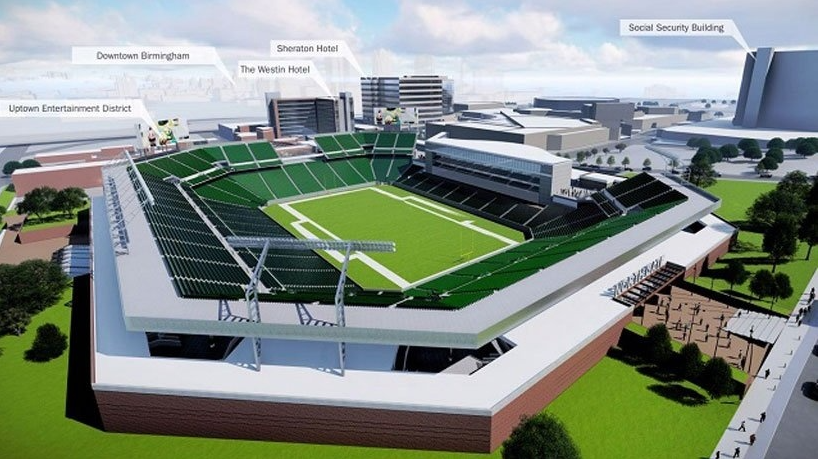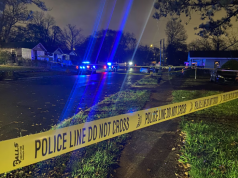By Cody Owens
Birmingham City Council
Following a lengthy discussion, the Birmingham City Council voted to approve a resolution of intent to provide $90 million in funding — $3 million annually for 30 years — for the construction of a multi-purpose facility at the Birmingham-Jefferson Convention Complex (BJCC).
The council voted 7-0-1 to support the resolution of intent. Councilor Lashunda Scales abstained and Councilor Sheila Tyson was not present.
The vote was taken after some members of the public offered pointed criticism about the project and Councilor Steven Hoyt submitted a document with more than 20 questions about financing, minority-owned business inclusion, and the projected impact the proposal would have on economic development.
Mayor Randall Woodfin attempted to address some of the questions.
“Here is a need of the city of Birmingham. There has been zero funding for street paving over the last several years. That’s a need. We have a $428 million budget and we’ve put less than $2 million in getting rid of dilapidated houses. That’s a need. Tourism is a need as well. Economic development is a need. Investing in our existing infrastructure, including the $5 million we’ve already put into the BJCC Legacy Arena, is a need. This is not an isolated topic. We’re not talking about an investment in a stadium alone. It’s an investment in the BJCC and our communities.
Woodfin said he needed to find money to pave the streets. “I have to find money to invest in curbs sidewalks and lights and neighborhood revitalization. That money does not exist today. We could cut a lot of money or we could borrow money, but that’s not an idea any of us want to take. I think the return of this gets us to where those things can happen. If we’re going to generate new revenue where is that going to go? It will go toward those priorities that we don’t currently have funding for.”
Hoyt said he had a series of questions before making a decision.
“Every question I had, you answered,” Hoyt told the mayor on Tuesday. “We’ve been charged with having to make tough decisions. I’ve had to make tough decisions before, like with the baseball stadium. And it turned out to be a great thing. It’s moving and generating economic development. This is not a thoughtless process. We have to trust this mayor and his process. I have to trust someone who says he is going to put neighborhoods first.”
Members of the public spoke both in favor and against the project.

“I was almost angry when I first heard the details about the proposed stadium. The more I asked questions, the more I somewhat wrapped my head around supporting it,” said Iva Williams, who added that he still has concerns about the future of Legion Field. “I like the idea of the revenue being kicked back into the neighborhoods, but what about right now? Let us know what’s going on.”
Macon Evans, chief operations officer for the restaurant Your Pie, which has a location in Uptown, said he is excited for the potential boost in economic development the proposed stadium would bring.
“I wanted to bring a perspective from the business sector,” Evans said. “The Uptown district is event-driven. When there is an event, businesses in the area see three to four to five times the average sales,” said Evans, who added that he believes the tax revenue generated from the expansion of the BJCC would have a major impact on the entire city, not just Uptown.
According to the resolution approved by the council, certain conditions have to be met before any money is allocated. In January, the Jefferson County Commission approved $30 million in funding for 30 years; the largest contribution will be coming from the BJCC, who will pay $10.7 million in annual debt service for 30 years. The University of Alabama at Birmingham will lease the stadium for $4 million annually for their football games. Additional funding is expected from corporate sponsors as well.
In regards to the future of Legion Field, Woodfin said, “This is not a situation where we use the conjunction ‘or’ — it’s ‘and.’” He likened the situation to how the construction of Regions Field did not negatively impact the future of historic Rickwood Field.
Councilor Lashunda Scales, who was the lone abstention, spoke about the concerns she had with funding a new stadium the city would not own, while not allocating enough money to Legion Field, which has fallen into disrepair in recent years.
“I remember in December we talked about funding for Legion Field,” Scales said, referring to an item that would have allocated $30 million for repairs. “We spoke to the community and it got to be so chaotic that it was taken off the agenda. For a person who grew up in that community, I am hurt. I grew up around Legion Field… Mr. Mayor if you build this stadium where Legion Field is, I will be your biggest cheerleader. But if you don’t, it would be a disservice to the people…This is the living room conversation again but the kitchen and bathroom are still filthy.”
According to an independent feasibility study commission by the BJCC, the stadium, which is estimated to cost $174 million, could be completed as early as 2020 and generate roughly $5.5 million per year in tax revenue during the construction phase and as much as $9.9 million a year after construction. There has not been any specific number given as to exactly how much tax revenue will be earmarked for neighborhood revitalization, but Woodfin has indicated it will be a substantial portion, if not all of it.
Council President Pro Tem Jay Roberson said he has been involved with this ongoing discussion for years, as a member of the BJCC board of directors. “I’ve met with developers. I know this talk is about a stadium, but it’s bigger than that and the mayor touched on that,” Roberson said. “When the funding comes in place, there will be $90 million invested into the Druid Hills community. This is a major shot in the arm for North Birmingham. Jobs will be created to make this project possible. It’s a BJCC expansion project. It’s not just a stadium. It’s a part of neighborhood revitalization. The residuals will be put back into the neighborhoods.”



